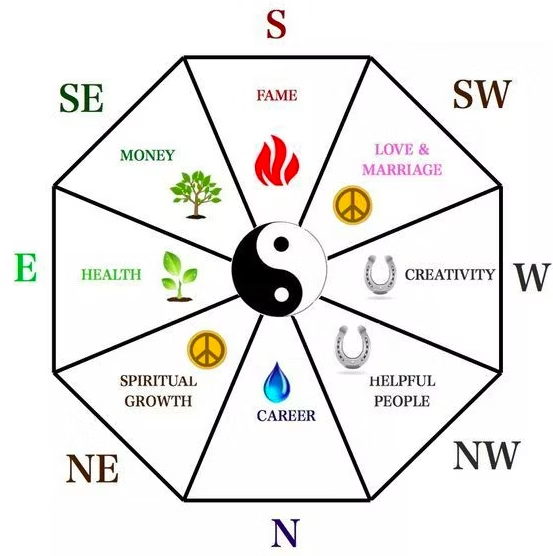Feng Shui 101

The Ba Gua Map
The Ba Gua map is a fundamental tool in Feng Shui used to analyze the energy of different areas within a space. It’s a grid that divides a space into nine distinct sections, each corresponding to specific aspects of life. By aligning this map with your home or office layout, you can identify which areas need attention to improve various aspects of your life.
There is a traditional way to do this which involves a compass, but the modern way to do it involves looking at the areas of each room in terms of back/far right, back/far left, middle, top right and top left. I will stand in the doorway of each room and consider the layout from that perspective.
This might get confusing, but I’ll explain below.
How to Use the Ba Gua Map
To apply the Ba Gua map to your space, align it with the layout of your home or office. You can start by standing at the entrance of your space and mapping out each of the nine areas according to the directions mentioned. Once you identify each sector, you can use Feng Shui principles to enhance specific areas to address your needs and aspirations.
Adjust for Modern Layouts
In modern homes with complex layouts, adapt the Ba Gua map to fit the structure of your space. Focus on key areas that align with the map’s sectors.
Nine Areas of the Ba Gua
Wealth (Southeast OR far/bottom left): This area is associated with financial prosperity and abundance. Enhancing this section with symbols of wealth, like a wealth vase or a plant, is believed to attract financial success.
Fame (South or middle back/far): This sector relates to reputation and recognition. Decorating this area with items that represent success and acknowledgment can boost your public image and professional standing.
Love/Relationships (Southwest or bottom/far right): The southwest corner of the Ba Gua is linked to love and romantic relationships. Adding pairs of objects or symbols of love in this area can foster harmonious and fulfilling relationships.
Family (East/or center right area): This section influences family bonds and health. Use this area to display family photos or items that represent family unity and support, which can strengthen familial connections and improve overall health.
Health (Center): The center of the Ba Gua is associated with overall health and well-being. Keeping this area clean and balanced helps promote physical and emotional health. Incorporate elements that support vitality, such as plants or calming colors.
Creativity (West or center left): This area is linked to creativity and children. Enhance it with artistic or inspirational items to stimulate creative energy and support the development of new ideas.
Knowledge (Northeast or immediate left): This sector relates to wisdom, learning, and self-cultivation. Place items like books or symbols of knowledge in this area to boost intellectual growth and personal development.
Career (North or entryway of a room): The north section of the Ba Gua is connected to career and life path. To enhance your professional journey, incorporate elements that represent career success and ambition.
Helpful People (Northwest or immediate right): This area influences relationships with mentors, supporters, and helpful people. Adding items that symbolize assistance and support can attract positive influences and helpful connections into your life.
Feng Shui and Space
Feng Shui involves arranging your space, furniture, and alignment of things to foster a sense of calm and relaxation. A well-organized environment free of clutter helps reduce stress and promotes mental clarity. Keeping your workspace clean and strategically placing calming elements like plants or water features can create a serene atmosphere that enhances focus and reduces anxiety. It’s a struggle for ME (Julie) as my desk, and laptop desktop often look chaotic, but taking the time to clear the physical space clears your mental space, too.
Scientific Perspective
While Feng Shui is rooted in ancient tradition, there is scientific backing for the idea that our environment impacts well-being. Studies on environmental psychology suggest that elements like natural light, room layout, and even color schemes can affect mood and productivity. Although not directly linked to Feng Shui, these findings support the concept that a thoughtfully arranged space can influence our emotional and physical health.
Environmental Impact on Health
In Feng Shui, a harmonious environment is believed to contribute significantly to physical health. Proper placement of furniture, adequate ventilation, and the use of soothing colors can help create a space that supports well-being. For instance, positioning your bed so that you have a clear view of the door while lying in bed is said to promote restful sleep and reduce anxiety. BUT you don’t want to place your bed in what is known as the “coffin” position–where the bed is aligned exactly with the door (feet to the door). This refers to when deceased bodies used to be taken out of homes while in their bed…(not good energy!)
Examples
Bed Positioning: Placing your bed in the “command position” (diagonally across from the door but not directly in line with it) is thought to help improve sleep quality and overall health. This arrangement allows you to see who is entering the room without being directly in the line of sight, which can promote a sense of security and relaxation.
Air Quality: Feng Shui advocates for clean, fresh air as essential for health. Using air-purifying plants like snake plants or peace lilies can improve air quality and contribute to a more balanced environment.
Colors: The use of specific colors in a space can affect mood and health. For example, calming colors like blue and green are believed to promote relaxation and recovery, while vibrant colors like red can energize and stimulate activity.
Wealth
In Feng Shui, the arrangement of your space influences financial success and overall prosperity.
The practice includes specific techniques and symbols believed to attract and enhance wealth. By optimizing the energy flow in your financial sectors, you can potentially improve your financial situation and opportunities for success.
Examples
Wealth Corner: The back left corner of your home (or any room) is traditionally associated with wealth and abundance in Feng Shui. Enhancing this area with symbols of prosperity, such as a wealth vase or a plant with rounded leaves, can be believed to attract financial growth.
Money Plant: The money plant, or Pachira aquatica, is often placed in the wealth corner to invite prosperity. Its rounded, glossy leaves are thought to symbolize money and success.
Fountain: A small water fountain in the southeast corner can help stimulate positive energy flow, which is said to attract financial benefits. The sound of flowing water represents abundance and is believed to encourage wealth accumulation.
Crystals and Symbols: Feng Shui practitioners often use crystals like citrine or pyrite, which are associated with wealth, or symbols like the Dragon and Phoenix to enhance financial luck. Placing these items in the wealth corner or on a desk can be part of a strategy to attract prosperity.
Love
Feng Shui offers various techniques for improving romantic relationships and fostering deeper connections. By arranging your space in a way that supports love and harmony, you can create an environment that nurtures healthy relationships and attracts positive energy.
Examples
Relationship Corner: The back-right corner of your home is traditionally linked to love and relationships. To enhance this area, you might place pairs of objects, such as two candles or two figurines, which symbolize partnership and harmony. The idea is that pairs represent unity and attract romantic energy.
Couple’s Picture: Displaying a happy photo of you and your partner (or an image representing love) in the southwest corner of your bedroom can help strengthen your bond. This placement is believed to invite positive energy into your relationship and promote mutual affection.
Romantic Colors: Colors such as pink and red are associated with love and romance in Feng Shui. Incorporating these colors into your bedroom through bedding, decor, or accent pieces can create a more romantic atmosphere. Avoid using too much red, as it can become overwhelming; instead, balance it with softer tones.
Remove Clutter: Ensuring that the area around your bed is clutter-free is crucial in Feng Shui. Clutter can create barriers to intimacy and disrupt the flow of positive energy. Keeping your bedroom tidy and serene can foster a more supportive environment for love.
Symbolic Objects: Objects like hearts or symbols of love can be strategically placed in the southwest corner of your home to attract and enhance romantic energy. A pair of Mandarin Ducks, which represent love and fidelity, is also a popular Feng Shui symbol for relationships.
Travel
In Feng Shui, the way you arrange your home can influence not only your immediate environment but also your experiences when traveling. By applying Feng Shui principles, you can create a space that supports safe and successful journeys, while also attracting positive energy for adventures and exploration.
Examples
Travel Corner: When you walk into a room, the immediate to-your-right area is associated with travel and helpful people. To enhance these areas, you might place items such as a globe, a map, or symbols of travel like airplanes or boats. These elements are believed to attract favorable travel experiences and assist in navigating your journeys. I like to place books, particularly books given to me by people who travel (and are helpful people to me) in this area.
Travel Symbols: Placing travel-related symbols or items in these corners can be beneficial. For instance, you could use a small travel-themed décor item or a picture of a destination you wish to visit. Such symbols are thought to attract positive energy and opportunities related to travel.
Protective Crystals: Crystals like turquoise or tiger’s eye are often used in Feng Shui for protection during travel. Placing these stones in the northwest corner of your home or carrying them with you can be believed to safeguard your journey and bring good luck.
Luggage and Packing: Feng Shui also suggests organizing your luggage and packing process to ensure smooth travels. Keeping your travel bags and gear in an organized and designated space helps to reduce stress and ensures you’re prepared for your trips.
Practical Tips
Living Room:
Layout: Arrange seating to facilitate conversation and ensure a clear flow of energy. Avoid placing seats with their backs to doors, as it can create a feeling of vulnerability.
Color: Use soothing colors like beige or light green to create a welcoming and relaxing atmosphere. Avoid overly dark or bright colors that might disrupt harmony.
Bedroom:
Bed Positioning: Place the bed in the command position, where you can see the door while lying in bed, but are not directly in line with it. This promotes a sense of security and restful sleep.
Decor: Use calming colors and keep the space clutter-free. Incorporate elements that foster intimacy, such as pairs of objects or romantic symbols, but avoid keeping electronics near the bed.
Office:
Desk Position: Position your desk so that you have a clear view of the door, ideally facing it. This arrangement is said to enhance focus and productivity.
Organization: Maintain a clean and organized workspace to promote clarity and efficiency. Use items that represent your goals and aspirations.
Kitchen:
Stove Placement: The stove is considered a crucial element in Feng Shui as it represents wealth and health. Ensure it is clean and functioning well. The ideal position is where you can see the entrance while cooking.
Clutter-Free: Keep countertops clear and organized. Clutter in the kitchen can symbolize stagnation in financial or health aspects.
Real-Life Examples
Home Office Success: A freelancer who applied Feng Shui principles to their home office reported increased productivity and a more organized workspace. By positioning their desk in the command position and using calming colors, they found themselves more focused and less stressed.
Health Improvement: A family who rearranged their bedroom according to Feng Shui principles experienced improved sleep and overall well-being. By positioning their bed properly and using soothing colors, they created a more restful environment.
Financial Growth: A small business owner who enhanced the southeast corner of their office with symbols of wealth and prosperity saw a noticeable increase in revenue. Incorporating a small fountain and a wealth vase helped them attract positive financial energy.
Feng Shui offers practical and ancient wisdom for creating balanced and harmonious spaces. By applying principles to various aspects of life—health, finances, love, and travel—you can enhance your environment and potentially improve your overall well-being and success.
It can be fun to incorporate Feng Shui practices into your daily life and it may just boost your career, improve relationships, or simply create a more peaceful home :).
Additional Resources
Books: “The Complete Idiot’s Guide to Feng Shui” by Elizabeth Moran, “Feng Shui for Dummies” by David Daniel Kennedy.
Websites: Feng Shui Society, Feng Shui Nexus.

